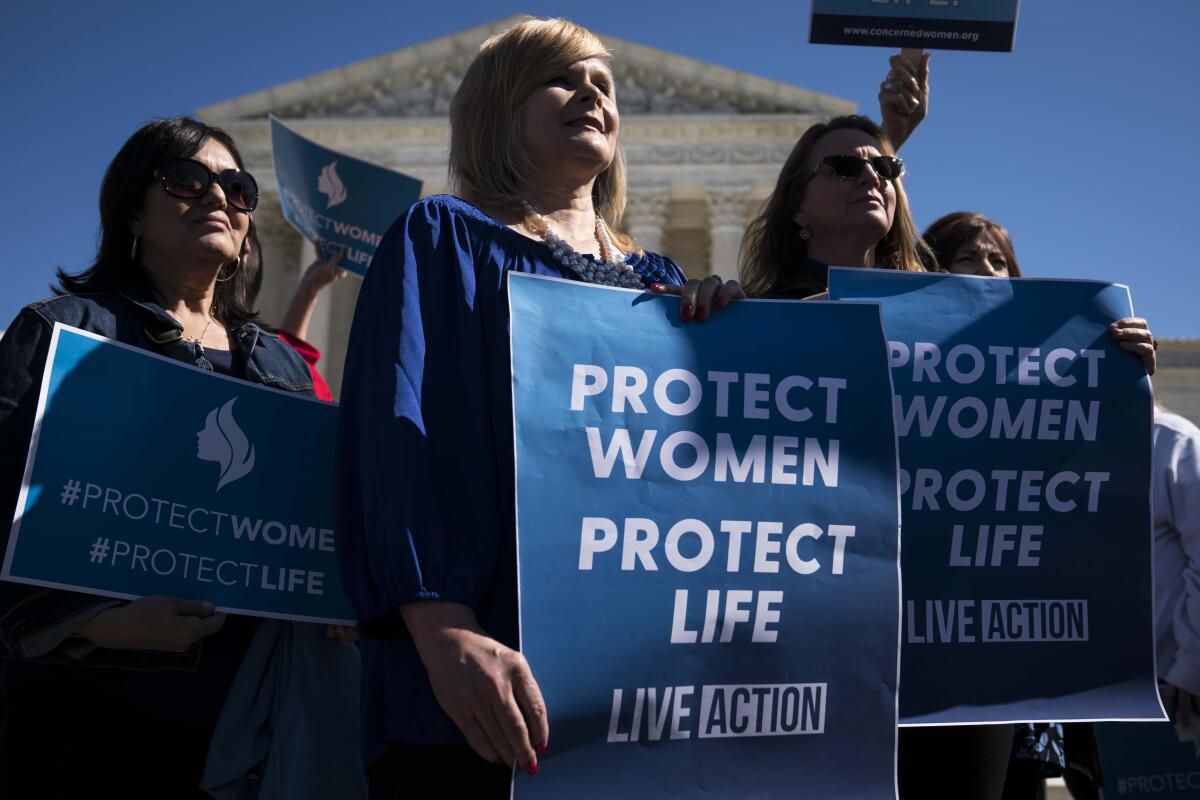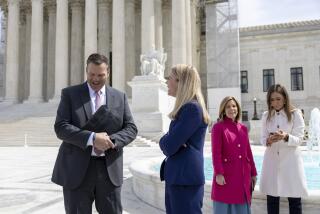Supreme Court liberals, with Roberts, strike down Louisiana abortion law

- Share via
WASHINGTON — Chief Justice John G. Roberts Jr. joined the Supreme Court’s liberal justices to deal a surprising setback to abortion opponents on Monday, striking down a restrictive Louisiana abortion law and reaffirming the court’s past rulings that have upheld a woman’s right to choose.
By a 5-4 vote, the court threw out a Louisiana law that would have required abortion doctors to have admitting privileges at a nearby hospital. If put into effect, it was expected to result in the closing of all but one of the state’s abortion providers.
It came as no surprise that the four liberal justices opposed the law since they struck down a similar Texas law four years ago. But the chief justice, a conservative who has consistently opposed abortion rights in the past and had voted to uphold the Texas law, cast the fifth vote with them, citing precedent as his reason.
It was the court’s first abortion ruling since President Trump’s two appointees took their seats, and it dashed hopes of abortion opponents who expected the more conservative court to move to repeal Roe vs. Wade, or at least give states more power to narrow it.
It also marked the third major decision in the past two weeks in which the chief justice joined with the court’s four liberals. The court extended workplace protections for LGBTQ employees and blocked Trump’s repeal of the Obama-era policy that protected so-called Dreamers from deportation.
A statement from the White House press secretary called the decision “unfortunate,” adding that “unelected justices have intruded on the sovereign prerogatives of state governments by imposing their own policy preference in favor of abortion to override legitimate abortion safety regulations.”
Anti-abortion advocates cast the loss in political terms, saying the ruling underscored the need to reelect Trump in November so he could appoint another conservative justice to provide the fifth voted needed to repeal Roe vs. Wade.
“Today’s ruling is a a bitter disappointment,” said Marjorie Dannenfelser, president of the Susan B. Anthony List, which opposes abortion. “It is imperative that we reelect President Trump and our pro-life majority in the U.S. Senate so we can further restore the judiciary, most especially the Supreme Court.”
Former Vice President Joe Biden, the presumptive Democratic presidential nominee, said the November election would be critical to protecting abortion rights.
“Let’s be clear: Republicans in state legislatures will stop at nothing to get rid of Roe -- and we have to be just as strong in our defense of it,” Biden said. “They are trying to get these laws appealed to the Supreme Court in the hope that Trump’s justices will vote to overturn Roe v. Wade. It’s wrong. It’s pernicious. And we have to stop it.”
Roberts, in a 16-page concurring opinion for June Medical Services vs. Russo, said he did not agree with the legal reasoning in Justice Stephen Breyer’s ruling, joined by the three other liberal justices, which said that the court should balance the health costs and benefits of each abortion regulation. A similar argument was used to strike down the Texas law.
But Roberts concluded nevertheless that the court should honor the outcome of the Texas decision.
“The legal doctrine of stare decisis requires us, absent special circumstances, to treat like cases alike. The Louisiana law imposes a burden on access to abortion just as severe as that imposed by the Texas law, for the same reasons. Therefore Louisiana’s law cannot stand under our precedent,” he said.
Roberts’ decision to cross the ideological divide to support a liberal precedent is in keeping with his stated concerns that the court is increasingly viewed by Americans through a partisan lens. In public statements, Roberts likes to say the justices do not decides cases as Republicans or Democrats.
Some Senate Republicans turned their ire on the chief justice. “If the court cares about preserving its legitimacy as a non-political institution, then it shouldn’t make decisions based on how its judgments will be perceived politically,” said Sen. Ben Sasse (R-Neb.). “The problem with today’s decision is absolutely terrible jurisprudence. Simply, bad lawyering.”
Roberts’ opinion on Monday suggested he would uphold some abortion regulations, but not those that greatly hamper women. Roberts also described as precedent the court’s 1992 ruling in Planned Parenthood vs. Casey, which reaffirmed the central principle of Roe vs. Wade that states may not put a “substantial obstacle” in front of women seeking abortions.
But in a line that might worry abortion rights advocates, Roberts also noted that in the Louisiana case, “neither party has asked us to reassess the constitutional validity of that standard.” That left open the possibility that he would be open to overturning Roe vs. Wade and the right to abortion if that question were squarely presented to the court.
Roberts’ defection does not bode well for at least a dozen Republican states that have enacted laws in the past two years that would severely limit or entirely ban abortion.
For years, former Justice Anthony M. Kennedy, a moderate Republican appointee, had cast the deciding votes with liberals to maintain the right to abortion.
Four years ago, the court struck down a Texas law nearly identical to the Louisiana law on the grounds that it put a heavy burden on women seeking abortions because it had the effect of closing more than half of the state’s clinics that provided abortions. Women who lived outside the state’s major cities would be forced to travel hundreds of miles to find an open clinic. By a 5-3 vote, with Kennedy, the court said the burdens of the state’s restrictions greatly outweighed the claimed benefits to health.
Roberts was among the conservative dissenters at the time. After Kennedy retired in 2018, he was replaced by the more conservative Justice Brett M. Kavanaugh.
Last year, four members of the court — Justices Clarence Thomas, Samuel A. Alito Jr., Neil M. Gorsuch and Kavanaugh — voted to allow the Louisiana law to take effect once it had been upheld by the 5th Circuit Court in New Orleans. But Roberts joined with the four liberals to put the law on hold while its constitutionality was reviewed.
Abortion rights advocates were relieved by Monday’s decision, but not ready to claim a final victory.
Kathaleen Pittman, administrator of the Hope Medical Group for Women in Shreveport, La., described the mood at the clinic Monday morning as “absolute giddiness.” But she added, “This week, we’re winning the battle, and that means we can stay open to fight another day. But as a provider, I’ll tell you, I’m celebrating today, but I’m still worried about our future.”
Others said the court narrowly avoided a devastating setback for women of color. Dariely Rodriguez, director of the economic justice project for the Lawyers’ Committee for Civil Rights Under Law, said, “Louisiana’s law would have had an especially stark impact on low-income Black women who have long faced systemic and structural barriers to healthcare, including abortion.”
The court heard arguments in the case during the first week in March, shortly before the court, like much of Washington, shut down because the coronavirus outbreak. The justices sounded closely split, and the chief justice did not signal how he would vote.
Lawyers for Louisiana defended the admitting privileges rule as a health and safety measure. They said it would help assure that only competent and trusted physicians were performing abortions and that their patients could be quickly transferred to a hospital in an emergency.
Abortion rights lawyers called the rule a sham and a deceptive scheme designed to shut down already embattled abortion clinics. They said that because early abortions are very safe, patients rarely are sent to a hospital. Typically, hospitals extend admitting privileges to doctors who regularly send patients there. And because abortion remains controversial, many hospitals, and especially in small towns and rural areas, are wary of having an affiliation with a doctor who performs abortions.
During the March argument, they told the justices that if the Louisiana law were upheld and the clinic in Shreveport closed, pregnant women could be forced to travel several hundred miles to New Orleans to see a doctor who provides an abortion.
Times staff writer Jenny Jarvie in Atlanta contributed to this report.
More to Read
Get the L.A. Times Politics newsletter
Deeply reported insights into legislation, politics and policy from Sacramento, Washington and beyond. In your inbox three times per week.
You may occasionally receive promotional content from the Los Angeles Times.











